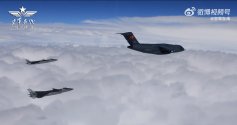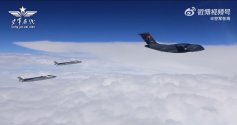You are using an out of date browser. It may not display this or other websites correctly.
You should upgrade or use an alternative browser.
You should upgrade or use an alternative browser.
J-20 5th Generation Fighter VII
- Thread starter siegecrossbow
- Start date
- Status
- Not open for further replies.
While Wilsbach here probably was trying to sound optimistic, I would say that at this point, PLAAF is probably actually "not losing any sleep" over the F-35 threat.
What is your assessment based on?
Lol if they think the PLA isn’t being willful about what capabilities they choose to disclose then they’re not taking this seriously enough.This is the most interesting stuff IMO we can only speculate about:
The late 2020s make a lot of sense regardless of the intelligence they might have. It is a date when many of the recent reforms will have a full effect, the recent highly-capable equipment will be operational in large numbers, and CONOPS will be more mature. It is also a date when the US, Japanese and Taiwanese forces won't be reformed. So if China wants to get over with Taiwan problem in the short term the late 2020s does make sense.Nothing wrong with showing confidence as a commander. Question though, where did the 2027 deadline originate from? Western media always states 2025, 2027, 2035, 2047 seemingly at random.
patchwork said something similar iirc; I think he was interested in launch areas for df-17s?This is the most interesting stuff IMO we can only speculate about:
Very interestingly I think one of Yankeesama's podcasts earlier this year (really can't remember which one, I listened to it after a 30 hr flight and half a day waiting at the airport and stayed awake just long enough to finish what comes next) mentioned that the US has always shown more worries if a certain weapons system shows offensive capability. The podcast was about the USAF statement on the J20/F35 encounter, and what I remember they said was along the lines of "if the J-20 doesn't show any offensive capabilities, able to drop guided munitions, etc, then it will most likely serve as more of a reactive role facing US threats and can, potentially, be worked around to some degree. On the other hand if they have proof that it has offensive capabilities then it's a whole other story as it can then be used in a proactive way and they'll have to figure out how to deal with it head on." They then half-jokingly said this is the reason why the USAF has been relatively unworried by the J-20 but at the same time scrambling to publish analysis papers everytime another slightly different H-6 variant is spotted.
The 'It's fine but we won't lose a lot of sleep over it' comment on the J-20 may have something to do with this mindset, but that's just my 2 cents. btw if anyone per chance is interested in the podcast I'll try and hunt it down for more details. Cheers!
The 'It's fine but we won't lose a lot of sleep over it' comment on the J-20 may have something to do with this mindset, but that's just my 2 cents. btw if anyone per chance is interested in the podcast I'll try and hunt it down for more details. Cheers!
If you think about the entire system. Some of the long range fire platforms that are coming online like hypersonic fire or are already in service like TLAM and LRASM are probably bigger things for China to worry about. F-35 is a nice aircraft, but it's not that survivable within first island chain. So then the question is what can US military use beyond that. That's where we bring in all the long range missiles.What is your assessment based on?
Even within PLAAF, the threat of 120 H-6Ks will be a lot higher than J-20s at this point.
Very interestingly I think one of Yankeesama's podcasts earlier this year (really can't remember which one, I listened to it after a 30 hr flight and half a day waiting at the airport and stayed awake just long enough to finish what comes next) mentioned that the US has always shown more worries if a certain weapons system shows offensive capability. The podcast was about the USAF statement on the J20/F35 encounter, and what I remember they said was along the lines of "if the J-20 doesn't show any offensive capabilities, able to drop guided munitions, etc, then it will most likely serve as more of a reactive role facing US threats and can, potentially, be worked around to some degree. On the other hand if they have proof that it has offensive capabilities then it's a whole other story as it can then be used in a proactive way and they'll have to figure out how to deal with it head on." They then half-jokingly said this is the reason why the USAF has been relatively unworried by the J-20 but at the same time scrambling to publish analysis papers everytime another slightly different H-6 variant is spotted.
The 'It's fine but we won't lose a lot of sleep over it' comment on the J-20 may have something to do with this mindset, but that's just my 2 cents. btw if anyone per chance is interested in the podcast I'll try and hunt it down for more details. Cheers!
broadsword
Brigadier
That was how the PACAF chief got Blitzo'ed.
- Status
- Not open for further replies.



